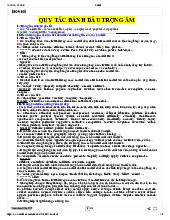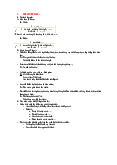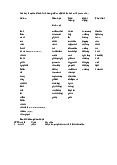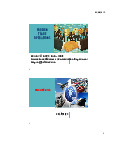











Preview text:
03:13 9/8/24 ELT Concourse catenative verbs Catenative verbs
The following lists do not consider marginal, semi- or pure modal auxiliary verbs.
Verbs followed by the to-infinitive
In nearly all cases, the use of the to-infinitive signals that the event represented by the main verb takes
place before that represented by the following verb(s). In other words, the use is prospective rather
than retrospective. This is not an absolute rule but is certainly the way to bet. For example, if one says: I agreed to come
then the agreeing clearly precedes the coming.
This rule of thumb applies even when the following action is unfulfilled as in, e.g.:
I declined to go with them
because even here, the declining precedes the not going.
The following are the most common of these verbs with some notes where necessary. Verb Example Notes advise He advised me to try This verb is almos
iably used with a direct object. Almost invari
an. This verb takes a noun as a direct obj a gerund so we allow: afford
We can afford to buy the car We a new car bu afford going on holiday
mE usage, this verb is transitive and that is
coming common in BrE, too so we allow also: agree They agreed to diff We agreed the plan.
However, like afford, a gerund as the object is not allowed. This is akin to We aim to take a winter aim
We are going to take a winter holiday holiday and is a prospective use.
The verb let takes the bare infinitive (see below).
This verb has a non-catenative use and allows a gerund allow I allowed him to go as the direct object, e.g.:
Do they allow fishing here?
This verb is also copular as in, e.g., She appeared appear She appeared to agree agreeable. apply They applied to leave
This verb is intransitive so no direct object is allowed.
This verb is transitive and often followed by a gerund arrange
They arranged to arrive early as the object as in, e.g.
The hotel arranged parking for us.
www.eltconcourse.com | Page 1 of 12 | about:blank 1/12 03:13 9/8/24 ELT Concourse catenative verbs
This is a transitive verb and allows any number of direct
objects, some of which, such as permission are verbal ask John asked to leave
nouns. It cannot, however, take a gerund as its direct object. attempt
She attempted to interrupt
Compare try (below) which varies in meaning.
This is a marginal modal verb expressing likelihood be bound
She is bound to disagree
usually, but can express obligation as in, e.g.:
I am am bound by my promise.
Formal use and collocation is limited to a few verbs beg I beg to differ (disagree, deny etc.).
Also possible with the -ing form with no change in begin It began to rain meaning.
This verb is nearly always used in the negative or in care
Would you care to dance?
questions only: i.e., non-assertive uses. The verb stop cate
es with an -ing form. With the infinitive, the in
on of stop plus to is in order to. This is no here and I cease the map cease I ceased to argue does he same as o look at the map
an -ing form as a direct object with this verb ceased arguing I chanced to meet e chance Formal use. hotel bar
This verb is transitive and often followed by a gerund choose I chose to stay silent as the object as in, e.g.
We chose flying over taking the train
Compare deign . This verb can be used (rarely) in the
They condescended to talk to condescend negative: me
She condescended not to complain.
This verb is transitive and may be followed by a gerund
Do you consent to pay the as the object as in, e.g. consent money?
We consented to his practising the piano in the evenings He contrived to get lost contrive Compare manage. somehow
Also possible with the -ing form with no change in continue
He continued to complain meaning. dare I dared to ask why This is a semi-modal verb.
www.eltconcourse.com | Page 2 of 12 | about:blank 2/12 03:13 9/8/24 ELT Concourse catenative verbs decide We decided to go Compare go. decline I decline to comment No negative use.
Formal use (compare the synonymous condescend).
The difference is that this verb cannot be used in the deign
She deigned to invite them negative:
*She deigned not to argue. Often in passive clauses: demand I demand to come I demand to be heard.
This verb is transitive and may be followed by a gerund
or other noun as the object as in, e.g. deserve She deserves to win
She deserved congratulating / congratulation
Here the subject of the sentence is not doing the
congratulating so the gerund form is acceptable.
This is a formal use. Frequently the participle adjective determine I determined to go is used as in, e.g., I am determine . The verb is a
h a gerund as the direct object, e.g.: encourage
She encouraged me to ask She
courage smoking in the hotel. Th
lways transitive so very often split from
y the direct object (see below).
pare try which can also be followed by the -ing endeavour I endeavoured to help rm. This verb cannot. elect She elected to sta
This verb is transitive and may be followed by a gerund as the object as in, e.g.
She expected travelling would be difficult at the expect Mary expected to fail weekend and by a simple noun: She expected rain. fail Mary failed to win
This also works with the gerund as a direct object in, e.g. I forbid smoking here forbid
I have forbidden him to come Again, the verb is always transitive so split from the
next verb by the direct object (see below for the passive use). forget I forgot to say thanks
See below for the changed meaning with the -ing form. happen I happened to see her
This is also considered a marginal modal auxiliary verb.
www.eltconcourse.com | Page 3 of 12 | about:blank 3/12 03:13 9/8/24 ELT Concourse catenative verbs
This is now almost confined to the set expression with hasten I hasten to add
to add or to say.
The bare infinitive can also be used as in, e.g. help
I helped to finish the work Can you help finish?
See also below for can't help plus the gerund. hesitate I hesitate to complain hope I hope to see you there instruct
She instructed them to wait
This verb is almost invariably used with a direct object.
More rarely, this verb is followed by an -ing form with intend
I intend to see him today no change in meaning.
This verb is almost invariably used with a direct object invite I was invited to speak
and frequently in the passive voice. learn
I learnt to swim at school long I long to see her again
They managed to arrive on manage time Here th
ns intend but it can be followed by mean
I meant to ask but forgot an -i
en the meaning alters to involve. move I move to adjourn formal meaning. need I need to leave soon
a semi-modal verb expressing obligation.
is verb is transitive and may be followed by a gerund as the object as in, e.g. neglect I neglected to t
She neglected watching the children or by a simple noun: She neglected her duty.
This verb is invariably used with a direct object and oblige
She was obliged to do the work frequently in the passive voice. offer I offered to help
This verb is transitive and often takes an object gerund or noun phrase such as: omit
I omitted to ask that question
I omitted painting the doors
She omitted the attachment order He ordered me to leave
These verbs are invariably used with a direct object and permit
John was permitted to stay
frequently in the passive voice. persuade I persuaded her to pay plan I planned to go
Compare intend and mean. prepare I prepared to travel
www.eltconcourse.com | Page 4 of 12 | about:blank 4/12 03:13 9/8/24 ELT Concourse catenative verbs
This verb is invariably used with a direct object and press I pressed him to help
frequently in the passive voice. pretend They pretended to work
Formal use. Unlike the synonymous start and begin, it proceed
I proceeded to start at once
cannot catenate with a an -ing form. promise I promise to help
This is a slightly formal version of plan or intend and propose I propose to go
the verb can also be used to mean suggest when it is used with an -ing form. refuse I refuse to help remember I remembered to ask
See below for the changed meaning with the -ing form.
This verb is invariably used with a direct object and remind
They reminded us to come
frequently in the passive voice.
This verb is invariab y used with a direct object and
She requested them to be request frequently in the e voice. It is quite rare and quiet formal. resolve I resolved to wait seek I sought to explain seem She seemed to be happy
ppear. This verb is also frequently a copula.
rb can be used, like begin, with an -ing form with start She started to eat meaning change. strive I strove to understa Formal use. The compan s to struggle survive swear
Mary swore to tell the truth teach He taught me to swim
These verbs are invariably used with a direct object and tell I told her to try
frequently in the passive voice. tempt I was tempted to leave tend
They tend to stay up late
This is also considered a marginal modal auxiliary verb. threaten They threatened to sue trouble
Please don't trouble to drive
This is almost exclusively used in the negative. try Try to be more helpful
See below for the changed meaning with an -ing form.
They undertook to act as undertake agents volunteer
John volunteered to help
www.eltconcourse.com | Page 5 of 12 | about:blank 5/12 03:13 9/8/24 ELT Concourse catenative verbs
This is sometimes followed by and plus a verb as in, e.g., Wait and see.
I waited to see what she would wait
The form is sometimes prepositional: say
I waited in order to see what she would do
with a subtle change of meaning. want I want to go now
Formal use. This verb is transitive and may be followed wish I wish to complain
by a gerund as the object as in, e.g.
She wished flying were possible
By their nature, many structures with would follow this would like Would you like to come? pattern.
The following only catenate in the passive. In the active form, the object is placed between the verb and the non-finite form.
Almost all the uses are more formal.
They were not allowed to allow come ask
She was asked to keep it call
They were called to explain Formal command I was commanded to stay compel
John was compelled to explain
often difficult to distinguish this use from a destine He was destined to fail
edicative participle adjective.
This is non-catenative when the participle adjective is They were en to encourage used: come
The were encouraged by the result. entitle
I am not entitled to complain
Actively, this verb is also used with the gerund as a forbid
I was forbidden to enter direct object. force
She was forced to work late instruct
I was instructed to remain
They were intended to have See above for the verb used in a slightly different intend the money sense. invite
She was invited to attend
The sense here is different from the example of move move I was moved to complain above. order
They were ordered to appear permit
They were permitted to enter
www.eltconcourse.com | Page 6 of 12 | about:blank 6/12 03:13 9/8/24 ELT Concourse catenative verbs press
She was pressed to respond
This is an unusual use and the preferred form is the prohibit
She was prohibited to come
prepositional phrase with from + a gerund. request
You are requested to leave require
She is required to remain teach I was taught to swim
This verb is transitive and may be followed by a gerund tell They were told to stay as the object as in, e.g.
She was told staying another day was possible
Arguably, this is a participle adjective use of the verb tempt I was tempted to go form.
Verbs followed by the gerund (-ing form)
These verbs consistently refer to past experience or to a retrospe e view of events. For example, if one says:
She admitted stealing the money
it is clear that the admission follows the theft and in, e
I hate standing in a queue
the clear implication is that the speaker has exp
tanding in a queue and hates it. Compare:
I would hate to hurt his feelings
which is clearly a prospective use and the nates with the infinitive.
This is an unreliable rule of thumb an many exceptions.
The other aid to memory is that th
of verbs used with a gerund can just as easily (often more
naturally) be followed by a dir
ject. As a gerund is often described as a verbal noun, this is unsurprising.
Not listed here are phrasal and repositional verbs because, with rare exceptions they are always followed by the gerund. Verb Example Notes They acknowledged
acknowledge making a mistake They admitted stealing admit the money I just adore watching adore them
They advised waiting a This appears to break the prospective rule but, arguably, is a advise little
verb which can take a nominalised clause as the direct object. I appreciate receiving appreciate the help
www.eltconcourse.com | Page 7 of 12 | about:blank 7/12 03:13 9/8/24 ELT Concourse catenative verbs I can't avoid thinking avoid
Compare the use of help in this meaning. about it
I can't bear talking to Confined to negative and interrogative uses (i.e., non - can't bear him assertive forms).
They have completed Arguably, a case of the gerund as a nominal object. Compare: complete repairing the car
They have completed the repairs. I considered taking the consider
These are prospective and break the 'rule'. car
However, the uses are all, arguably, with the gerund used as
I deferred making a the direct object. Compare: defer decision I considered the offer I deferred my decision We should not delay delay
We delayed the celebration. opening I deny taking the deny money
I detest queuing for Arguably, with all three
hese verbs the -ing form is a detest things gerund and can be r any other noun so we can have: She dislikes arguing dislike I detest avoc with people I dislike b I dread meeting his She en od dread mother but i guing with him a catenative structure.
erb dread appears to break the prospective rule but the They enjoy le enjoy
eling is based on some previous knowledge or experience. French
(There is a prospective use of dislike which predictably takes
the to-infinitive form as in, e.g.:
I dislike to have to tell you that ...) The work
entails Arguably, a case of the gerund as a nominal object. Compare: entail rewriting the program
The work entails a lot of expense. He escaped being escape called up
This is a prospective use and breaks the 'rule' although it is
arguably premised on seeing films before. It is also arguably fancy I fancy seeing a film
a verb which takes a nominalised object or a simple noun as in: I fancy some lunch.
This appears to break the prospective rule but, arguably, is a
She favoured waiting a verb which can take a nominalised clause as the direct object. favour little Compare:
She favoured the restaurant in the market place.
www.eltconcourse.com | Page 8 of 12 | about:blank 8/12 03:13 9/8/24 ELT Concourse catenative verbs They have
finished Arguably, a case of the gerund as a nominal object. Compare: finish painting the house
They have finsihed the painting. forget I forgot meeting her
See above for the changed meaning with the to-infinitive. hate I hate teaching
This is a gerund use. For hate + to-infinitives, see below.
I can't help thinking Usually confined to negative or interrogative (i.e., non - can't help about it assertive uses).
This is often, but not invariably, used in the negative with can (can't)
I can't imagine living but assertive forms are also seen: imagine with her
I can imagine living here.
This is a prospective use and breaks the 'rule' but, arguably, is It implies
spending a verb which can take a nominalised clause as the direct imply even more money object. Compare:
It implies a good deal of work.
This is a prospective use and breaks the 'rule' but, arguably, is
It involves travelling to a verb which can take a
ominalised clause as the direct involve Russia object. Compare: It involves a lot of He keeps arguing with keep me
I left doing the work till leave This i
tive use and breaks the 'rule'. later like I like talking to them loathe She loathes eating love I love living he He didn't me on mention seeing her mind I don't mind waiting
Usually used on the negative or, + would, in questions. I miss working with miss them She is
practising Often the verb takes a direct noun object: practise playing the piano
She is practising the flute.
This can be used with the to -infinitive with little change in prefer I prefer eating late meaning (see below).
Mostly AmE usage and, arguably, the use of the gerund as a quit I have quit smoking direct object: She has quit her job. recall I recall seeing him Compare remember. recollect I recollect asking
www.eltconcourse.com | Page 9 of 12 | about:blank 9/12 03:13 9/8/24 ELT Concourse catenative verbs
This is a prospective use and breaks the 'rule' but, arguably, is
I recommend asking a verb which can take a nominalised clause as the direct recommend her object. Compare:
She recommended the restaurant in the market place. regret I regret asking her
See below for the changed meaning with a to-infinitive. I remembered meeting remember
See above for the changed meaning with a to-infinitive. her
I do not require telling require twice I resent waiting in the resent cold I can't resist laughing resist
Almost always in the negative with can't. at her
We resumed working Unlike start and begin , this verb cannot be used with the to - resume at 5 infinitive. He risked losing risk everything I can see knowing for see certain is better She shunned meeting shun This e. them I can't stand walking i
most solely used in the negative and with the modal (can't) stand the wind ary verb.
his is a prospective use and breaks the 'rule' but, arguably, is
a verb which can take a nominalised clause as the direct stop Please stop talking object. Compare:
She stopped her presentation.
Like recommend, this verb takes a direct object noun phrase, I suggest waiting a suggest too: little I suggest the fish.
I can tolerate working This verb often takes a simple noun direct object: tolerate with them
I can't tolerate his behaviour. Try using a heavier try
See above for the changed meaning with a to-infinitive. hammer We understand getting understand
the right price is vital The window wants want BrE usage. cleaning
www.eltconcourse.com | Page 10 of 12 | about:blank 10/12 03:13 9/8/24 ELT Concourse catenative verbs
The following only catenate marginally because a possessive determiner (or, informally, an object
pronoun) is inserted between the verb and the non-finite form. I can't excuse her excuse insulting me
Can you explain their In all these cases, the use of the -ing form may be considered explain leaving?
as the gerund acting as a direct object of the verb so we can also encounter, e.g.: Please forgive my forgive I can't excuse rudeness asking
Can you explain the problem? I can't pardon her
Please forgive any mistakes pardon swearing He won't pardon errors I cannot prevent your
That won't prevent the leaks prevent going
We don't understand the instructions I understand her understand leaving early
Verbs followed by the either an -ing form or to-infinitive
very little) change in meaning
There are a few verbs which can be followed by either
itive or a gerund with no change in
meaning. Sometimes one form is more common (m intend bother I intend going
She didn't bother telling me I intend to go†
She didn't bother to tell me† start continue I started to walk†
He continued to complain† I started walking
He continued complaining bear like
I can't bear to listen to ra music I like swimming†
I can't bear listening to rap music† I like to swim begin prefer It began to snow†
I prefer working at home It began snowing
I prefer to work at home
www.eltconcourse.com | Page 11 of 12 | about:blank 11/12 03:13 9/8/24 ELT Concourse catenative verbs
Verbs followed by the either an -ing form or to-infinitive with a change in meaning
A few polysemous verbs vary in meaning depending on whether they are followed by a gerund or a to-infinitive. remember try
I remember posting the letter Try opening a window
I remembered to post the letter Try to open a window forget mean I forgot meeting him I mean to talk to her I forgot to meet him
It means travelling to London regret propose
I regret to tell you that you are wrong
I propose to go to America
I regret telling you that you are wrong
I propose going to America
Verbs followed by to and an -ing form
A few verbs are followed by to plus a gerund, -ing form. An alternative analysis is that these are simply
examples of the gerund after the preposition to. be used
o waiting for you in the rain
I am used to working late at the office be accustomed
k to playing golf when I retired
I am accustomed to walking in the be averse snow
I am averse to eating in smoky be up restaurants
Are you up to eating something? be opposed feel up
I am opposed to taking risks with my
Do you feel up to walking to r money lunch? committed look forward
She is committed to helping them
I look forward to meetin er mother object
Verbs followed by a bare infinitive
A few verbs can catenate with the bare infinitive although in one case (help) the to-infinitive is also possible. Here's the list: let hear Don't let go!
I hear tell he's quite rich make help
I can make do with almost no money
Please help repair the table
The insertion of to is optional.
www.eltconcourse.com | Page 12 of 12 | about:blank 12/12




